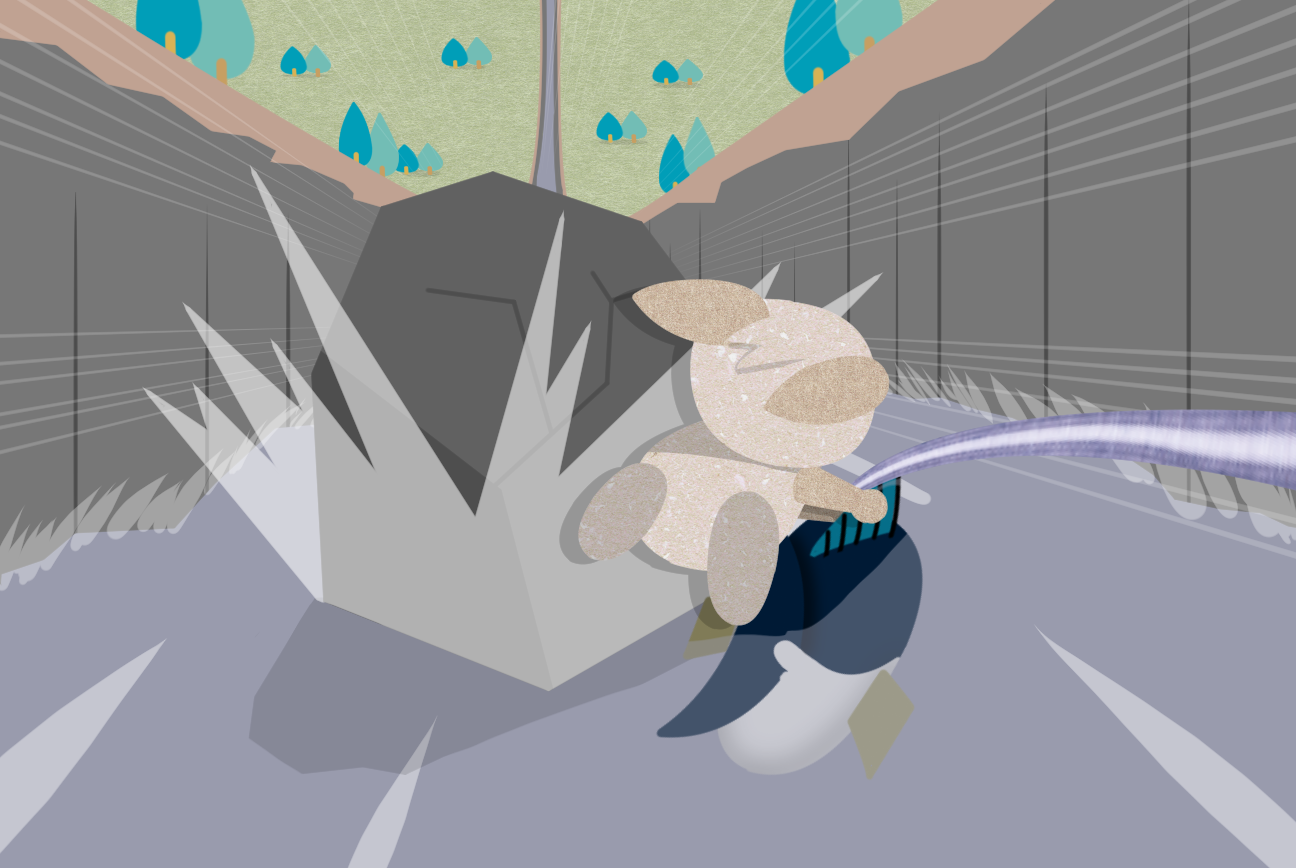ペラペラ英語飯71「岩を左右にかわしながら川を下る」
(前回までのあらすじ)ピットと魚は時速100マイルの速度で川を下り、目の前に岩が迫ってきました。
When the rock approached about 10 yards ahead, The fish tilted his body to the right by 45 degrees. Then, the fish’s perspective tilted to the right by 30 degrees roughly, and he dodge the rock.
Although Pit was almost shaken off by this, he held on to the back fin with his full power. The rock slightly hit Pit’s foot when the fish dodged it, but this was no time to care about the pain.
After dodging the rock, immediately another rock appeared in front of them. Next, the fish dodged the rock to the left side.
英語専門家 IDIY JUNKO チェック
解説
When the rock approached about 10 yards ahead, The fishtiltedhis body to the right by 45 degrees.
訳「前方10ヤードくらいの距離に岩が接近したとき、魚は身体を右に45度傾けました。」
従位接続詞のwhen「~のとき」を使った副詞節が主節を補足しています。
⇒「従位接続詞whenとは」
この文のbyは程度「~まで」を意味するbyで、角度を表現するときも使われます。
The azimuthal magnet rotated by 45 degrees. 「方位磁石が45度回転した。」
日本とアメリカの距離の単位の違いについては次の記事を参照して下さい。
⇒「日本とアメリカの距離の単位の違い」
Then, the fish’s perspectivetilted to the right by 30 degrees roughly, and hedodgethe rock.
訳「すると、魚の視界が右に30度くらい傾き、岩をかわしました。」
※この英文には問題がある可能性があります。現在確認中です。
この文は等位接続詞のandを使って以下の2つの文を繋いでいます。
⇒「等位接続詞andとは」
(A)The fish’s perspective tilted to the right by 30 degrees roughly.
(B)He dodge the rock.
Although Pit was almost shaken off by this, heheld on tothe back fin with his full power.
訳「ピットは魚の動きで振り落とされそうになりましたが、全力で背びれに捕まっています。」
従位接続詞のalthough「~だけれども」を使った副詞節が主節を補足しています。
⇒「従位接続詞thoughとは」
shake off~は「~を振り払う」という意味です。shakeの活用に注意して下さい。
| 現在形 | 過去形 | 過去分詞 |
|---|---|---|
| shake | shook | shaken |
hold on to~は「~につかまる」という意味です。holdの活用に注意して下さい。
| 現在形 | 過去形 | 過去分詞 |
|---|---|---|
| hold | held | held holden |
with one’s full powerは「全力で」という意味です。物理的な全力以外の精神的な一生懸命の意味でも使われます。他に以下のような表現もあります。
| 意味 | 慣用句 |
|---|---|
| 一生懸命に | with one's full effort |
| with all one's might | |
| with all one's efforts |
The rock slightly hitPit’s footwhen the fish dodged it, but thiswasno timeto care about the pain.
訳「岩をかわしたときにピットの足が岩に少し当たりましたが、痛がっている場合ではありません。」
この文は等位接続詞のbutを使って以下の2つの文を逆接でつないでいます。
⇒「等位接続詞butとは」
(A)The rock slightly hit Pit’s foot when the fish dodged it.
(B)This was no time to care about the pain.
Aの文では従位接続詞のwhen「~のとき」を使った副詞節が主節を補足しています。
⇒「従位接続詞whenとは」
Bの文では不定詞を使った形容詞句がtimeを修飾しています。
⇒「不定詞の形容詞用法」
this is no time to~は「~している場合ではない」という意味です。
care about~は「~に気をかける」という意味です。
hitの活用は変化しないので注意して下さい。
| 現在形 | 過去形 | 過去分詞 |
|---|---|---|
| hit | hit | hit |
After dodging the rock, immediately another rockappeared in front of them.
訳「岩をかわしたあと、すぐに別の岩が目の前に現れました。」
in front of~は「~の前に」という群前置詞です。群前置詞とは2語以上が集まって1つの前置詞として働く語です。普通の前置詞と同じように、後ろに名詞(または動名詞)を置いて副詞句になります。
anotherは「他の~」という意味の不定代名詞です。
⇒「不定代名詞otherとは」
Next, the fishdodgedthe rock to the left side.
訳「今度は、魚は左に岩をかわしました。」
全文訳
前方10ヤードくらいの距離に岩が接近したとき、魚は身体を右に45度傾けました。すると、魚の進行方向が右に30度くらい傾き、岩をかわしました。
ピットは魚の動きで振り落とされそうになりましたが、全力で背びれに捕まっています。岩をかわしたときにピットの足が岩に少し当たりましたが、痛がっている場合ではありません。
岩をかわしたあと、すぐに別の岩が目の前に現れました。今度は、魚は左に岩をかわしました。
英語飯チェック
| 語句 | 意味 |
|---|---|
| approach | 近づく |
| tilt | 傾ける |
| perspective | 視界 |
| roughly | 大体 |
| managed to | 何とか~する |
| dodge | かわす |
| rock | 岩 |
| shake off~ | ~を振り払う |
| hold on to~ | ~につかまる |
| with one's full power | 全力で |
| slightly | わずかに |
| this is no time to~ | ~している場合ではない |
| care about | ~に気をかける |
| immediately | すぐに |
| appear | 現れる |
| in front of~ | ~の前に |
